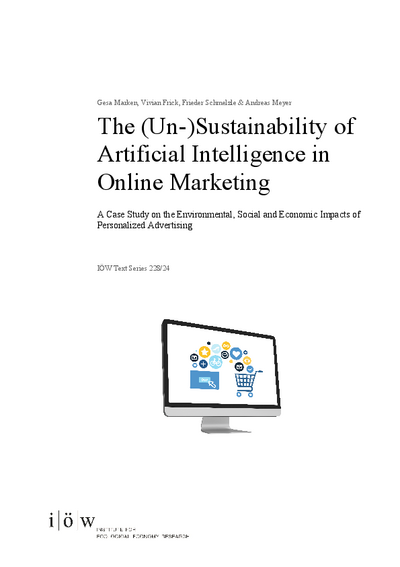The (Un-)Sustainability of Artificial Intelligence in Online Marketing A Case Study on the Environmental, Social and Economic Impacts of Personalized Advertising
Artificial intelligence (AI) systems can be used in various sectors and applications. A prominent case can be found in personalized online advertising where data collection, analysis and targeting techniques are enabled by machine learning. Personalized ads rely on extensive data mining, segmentation and the creation of user profiles, whereby specific ads are matched to specific persons in real time with the help of automated ad auctions. AI systems help the marketing industry to gather detailed information on online users, their devices, the software they use, the content they access and patterns of their on- and offline behavior. Thus, AI contributes to the immense revenues and market power of the few dominating players who often take multiple roles at the same time (e.g., advertisers, publishers and intermediaries).
In this study the IÖW and the DAI Laboratory at the TU Berlin show that the use of AI for personalized advertising is not sustainable but poses substantial risks to individuals, the environment and society. With a holistic sustainability assessment perspective, the study examines AI’s direct and indirect environmental effects, individual and societal effects as well as economic effects on a direct business level and a macroeconomic level. The study pursues an interdisciplinary mixed methods approach to investigate the role of AI in online marketing, the functioning of various AI applications and respective consequences for sustainability. This is done with a literature review, an online survey with online users and advertising businesses, an interview study as well as modellings and measurements of the energy consumption from targeting. The authors captured views on personalized online marketing, AI, personal awareness, conduct, measures and business strategies. Finally, they propose recommendations for (political) action to strengthen sustainability.
The demand for data transmission, processing and storage causes substantial energy consumption and carbon emissions. The large quantities of personal data used for personalized advertising significantly contribute to these impacts. Material and energy intakes increase along respective ‘data life cycles’ and due to additional consumption caused by online marketing. Moreover, there are immense social challenges concerning data protection, loss of individual privacy and autonomy as well as the dissemination of disinformation. AI systems seem to have an intensifying effect on those risks as they make processes less controllable and comprehensible. Further issues arise as the few leading actors in online marketing own most of the required data, technology and infrastructure. In conclusion, the application of AI in online marketing today is more a barrier to sustainability than an opportunity.



